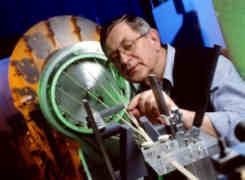Tomorrow’s High-Temperature Superconducting Cables

Developers have succeeded in "stranding" HTS wires into cables. <br>
Future generations of electric trains may use considerably less power than they do today thanks to the development of the first high temperature superconducting (HTS) cable. To produce the cable, Scientists at Siemens Corporate Technology in Erlangen, Germany started out with micron-sized particles of a brittle ceramic material. The particles were then embedded in a silver alloy. Through repeated rolling stages and annealing, the material was turned into ribbon-shaped wires. To make a cable from such wires, the developers employed a technology used in manufacturing transformers, whereby several HTS strip conductors are “stranded” into a flat cable. This method opens the door to large-scale production of flexible, high capacity / low loss cables. Altogether, engineers managed to strand 13 wires into a 400 meter-long cable. They then installed the cable in a model HTS transformer with an output of one megavolt-ampere (MVA) – enough to drive a normal passenger train. The new technology could reduce the weight of such a transformer by a third without any reduction in output. In addition, it would have an efficiency of over 98 percent compared to the “mere” 90 percent of a conventional transformer.
Media Contact
All latest news from the category: Process Engineering
This special field revolves around processes for modifying material properties (milling, cooling), composition (filtration, distillation) and type (oxidation, hydration).
Valuable information is available on a broad range of technologies including material separation, laser processes, measuring techniques and robot engineering in addition to testing methods and coating and materials analysis processes.
Newest articles
Faster, more energy-efficient way to manufacture an industrially important chemical
Zirconium combined with silicon nitride enhances the conversion of propane — present in natural gas — needed to create in-demand plastic, polypropylene. Polypropylene is a common type of plastic found…

Energy planning in Ghana as a role model for the world
Improving the resilience of energy systems in the Global South. What criteria should we use to better plan for resilient energy systems? How do socio-economic, technical and climate change related…

Artificial blood vessels could improve heart bypass outcomes
Artificial blood vessels could improve heart bypass outcomes. 3D-printed blood vessels, which closely mimic the properties of human veins, could transform the treatment of cardiovascular diseases. Strong, flexible, gel-like tubes…





















